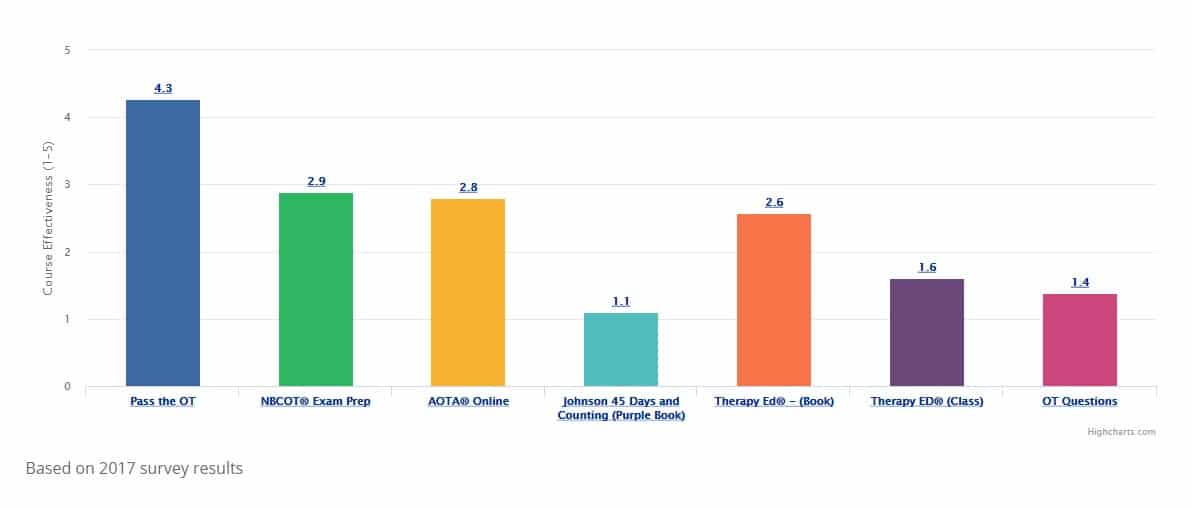Occupational Therapy Code of Ethics
The Occupational Therapy Code of Ethics was developed by the American Occupational Therapy Association (AOTA) to document the core values and ethical principles that govern occupational therapy practice in the United States.
This document is maintained by AOTA and updated periodically. The Occupational Therapy Code of Ethics is proprietary information and the full document can be viewed through the AOTA website.
This chart provides main points and examples from the Code of Ethics for study purposes.
Core Values
| Value | Description | Example |
| Altruism | Altruism is the unselfish concern for the welfare of others. This concept is reflected in actions and attitudes of commitment, caring, dedication, responsiveness, and understanding.
– Demonstrating concern for the welfare of others. |
1. An OT asks her patient how the patient is feeling during the OT session.
2. An OTA helps a patient make a card for his wife on her birthday and buys flowers for the patient to give to his wife. |
| Equality | Equality requires that all individuals be perceived as having the same fundamental human rights and opportunities. This value is demonstrated by an attitude of fairness and impartiality. We believe that we should respect all individuals, keeping in mind that they may have values, beliefs, or life styles that are different from our own. Equality is practiced in the broad professional arena, but is particularly important in day-to-day interactions with those individuals receiving occupational therapy services.
– Treating all people impartially and free of bias. |
1. An OT clinic accepts all patients who have a physician’s referral for OT regardless of race, gender, ethnic background, lifestyle, etc.
2. An OT running a group ,has a personality clash with one of the patients. Despite her personal feelings about this patient, the OT treats him as she would, another patient – with respect. |
| Freedom | Freedom allows the individual to exercise choice and to demonstrate independence, initiative, and self-direction. Purposeful activity plays a major role in developing and exercising self-direction, initiative, interdependence, and relatedness to the world. Activities verify the individual’s ability to adapt, and they establish a satisfying balance between autonomy and societal membership. As professionals, we affirm the freedom of choice for each individual to pursue goals that have personal and social meaning.
– Patients are given personal choices based on their values and desires. |
1. An OTA agrees to set up a home exercise program for an outpatient who prefers to complete her therapy at home as she has young children.
2. An OTA working with a male patient is told by that patient that he does not want to participate in a cooking activity as it is a “woman’s job!” The OTA gives the patient choices of other activities which could be used instead of cooking, and would achieve the same treatment goals. |
| Justice | Justice places value on the upholding of such moral and legal principles as fairness, equity, truthfulness, and objectivity. This means we aspire to provide occupational therapy services for all individuals who are in need of these services and that we will maintain a goal-directed and objective relationship with all those served. Practitioners must be knowledgeable about and have respect for the legal rights of individuals receiving occupational therapy services. In addition, the occupational therapy practitioner must understand and abide by the local, state, and federal laws governing professional practice.
– Diverse communities are inclusive, structured, and organized so that all members can function, flourish, and live satisfactory lives. |
1. An OT facilitates a multiple sclerosis support group, making sure each member has time to tell his or her story without monopolizing more group time than the other members.
2. An OTA working in a long term care facility is given an expensive gift by a patient. The OTA does not accept the gift as it would unduly influence the therapeutic relationship or have the potential to blur professional boundaries. 3. An OTA notices a disabled homeless man struggling to walk, and establishes that he would benefit from OT intervention. The OTA approaches the man and offers to help him obtain a referral for OT Services at the local clinic, where she works. The clinic offers pro-bono services to those in need. |
| Dignity | Dignity emphasizes the importance of valuing the inherent worth and uniqueness of each person. This value is demonstrated by an attitude of empathy and respect for self and others. We view human beings holistically, respecting the unique interaction of the mind, body, and physical and social environment. We believe that dignity is nurtured and grows from the sense of competence and self-worth that is integrally linked to the person’s ability to perform valued and relevant activities. In occupational therapy we emphasize the importance of dignity by helping the individual build on his or her unique attributes and resources.
– Treat all patients with respect at all times. |
1. An OTA escorts a woman with Alzheimer’s disease back to her room, patiently answering the same question 5 times and addressing the patient by her name.
2. While working with a patient on bed-wheelchair transfers, the OTA draws the curtain around the patient’s bed / ensures that the patient is fully covered, so that she does not expose herself to other patients in the ward. |
| Truth | Truth requires that we be faithful to facts and reality. Truthfulness or veracity is demonstrated by being accountable, honest, forthright, accurate, and authentic in our attitudes and actions. There is an obligation to be truthful with ourselves, those who receive services, colleagues, and society. One way that this is exhibited is through maintaining and upgrading professional competence. This happens, in part, through an unfaltering commitment to inquiry and learning, to self-understanding and to the development of an interpersonal competence.
– Provide accurate information in oral, written and electronic forms in all situations. |
1. While writing an initial evaluation report, an OT documents that she did not test cognitive skills, rather than writing that cognition appeared normal.
2. When the director of the facility in which an OT is employed is asked if her OT license is valid, for that state, the OT answers honestly even if she has forgotten to renew her license. |
| Prudence | Prudence is the ability to govern and discipline oneself through the use of reason. To be prudent is to value judiciousness, discretion, vigilance, moderation, care, and circumspection in the management of one’s affairs, to temper extremes, make judgments and respond on the basis of intelligent reflection and rational thought.
– Use clinical and ethical reasoning skills, sound judgement, and reflection to make decisions in professional and volunteer roles. |
1. An OTA determines that a patient is not yet ready to complete ADL tasks without supervision after observing the patient retrieving ADL items in an unsafe manner.
2. An OT has achieved her goals with a patient’s intervention. The following day, as the patient is about to be discharged from the hospital, she notices that he is struggling to negotiate stairs. The OT asks the patient to wait for her while she speaks to the physician about her concerns.The patient is at risk for injuring himself, especially when using public transport. |
Principles and Standards of Conduct
| Principle | Description | Examples |
| 1. Beneficence | Occupational therapy practitioners shall demonstrate concern for occupational therapy patients. | -Provide appropriate evaluation and treatment to patients (to benefit patient). -Ensure treatment is provided in a timely manner. -Revise treatment goals when necessary. -Use therapeutic treatment approaches that are evidence based and consistent with occupational therapy practice. -Provide treatment that is consistent with the therapist’s education, background and knowledge. -Demonstrate service competency to ensure therapeutic standards are met and gain knowledge of evidence-based approaches through continuing education, review of research, and other methods. -Terminate occupational therapy services when a patient’s goals are met or when insurance coverage is no longer available. -Refer patients to other practitioners when the patient’s symptoms and functional limitations warrants. |
| 2. Nonmaleficence | Occupational therapy practitioners shall take reasonable precautions to avoid inflicting harm on others or their property. Treatment goals should outweigh any risks. | -Consider the benefit of the treatment technique vs. any discomfort the patient experiences. A patient may complain that passive range of motion is uncomfortable, but the treatment is necessary to prevent contractures. -Never inflict harm to a patient during treatment. -Never abandon a patient during treatment. -Therapists should minimize their own personal problems while providing treatment to not burden patients. -Insure that influences that might compromise a treatment session are eliminated, such as removing another patient who is behaving inappropriately from the therapy clinic. -Set boundaries with patients and avoid personal or sexual relationships. -Never exploit patients for personal gain. |
| 3. Autonomy | Occupational therapy practitioners shall treat patients according to their wishes and shall keep patient information confidential. | -Respect patients’ views and wishes for treatment. If a patient prefers to receive treatment in his hospital room, attempt to accommodate that request. -Establish a therapeutic relationship with a patient to promote shared decision making. -Respect a patient’s right to refuse occupational therapy services, even if that decision is not in the patient’s best interests. -Comply with all applicable rights and privacy acts, including the Health Insurance Portability Accountability Act (HIPAA) and the Family Educational Rights and Privacy Act (FERPA). -Protect patients’ privacy and refrain from discussing patients in public areas and/or with people who are not involved in a patient’s treatment. -Address communication barriers with patients, such as language differences, illiteracy or aphasia. |
| 4. Justice | Occupational therapy practitioners shall provide occupational therapy services in a fair and objective manner.
The principle of ‘Social Justice’ was removed and replaced with a more generic term – ‘Justice’, which focuses on the procedural aspects of the Justice construct. http://abctherapeutics.blogspot.com/2015/05/social-justice-in-occupational-therapy.html |
-Respond to occupational therapy referrals or requests for referrals in a timely manner. -Assist patients in obtaining access to occupational therapy services by requesting referrals, assisting to solve problems with insurance coverage, helping patients obtain services on sliding fee scales, and similar efforts. -Work to change policies that unfairly limit access to occupational therapy services. -Maintain awareness of current laws and policies related to occupational therapy practice and keep facilities up to date on such laws and policies. -Obtain and renew the proper credentials necessary for a particular area of practice, such as a state license or a department of public instruction certification. -Refrain from accepting gifts that might adversely influence therapeutic relationships with patients. -Report any unethical or illegal activities to the proper authorities according to state and federal laws. |
| 5. Veracity | Occupational therapy practitioners shall represent the profession in a thorough, objective and accurate manner. | -Be truthful regarding occupational therapy credentials, education, experience, and competence in specific areas of treatment. -Refrain from using false, misleading, or unfair statements or claims. -Complete documentation of occupational therapy services in an accurate and timely manner. -Report any incidents that may adversely affect occupational therapy treatment, i.e. injuries during or resulting from treatment, to the appropriate people. -Ensure that all advertising of occupational therapy services is truthful and accurate. -Give the proper credit when using the work of others to produce oral, written, or digital information about occupational therapy services. -Be honest and fair when completing employee performance or student evaluations. |
| 6. Fidelity | Occupational therapy practitioners shall treat patients and other healthcare professionals with respect. | -Respect the privacy of other professionals unless required to report unethical or illegal actions. -Never attempt to use a position within an organization to control other employees. -Never misuse employer resources, such as billing an employer for more hours than were actually worked. -Keep communication with colleagues professional and respectful. -Do not harass other employees verbally, physically, sexually, or emotionally. -Represent a facility or organization accurately and follow the facility’s policies and procedures when acting on its behalf. -Avoid behaviors that would lead to the public’s mistrust of the profession. -Encourage collaborative efforts between professionals, including holding case conferences with all disciplines present. -Recognize when differences in personal, cultural, or religious values may interfere with the provision of services. |






